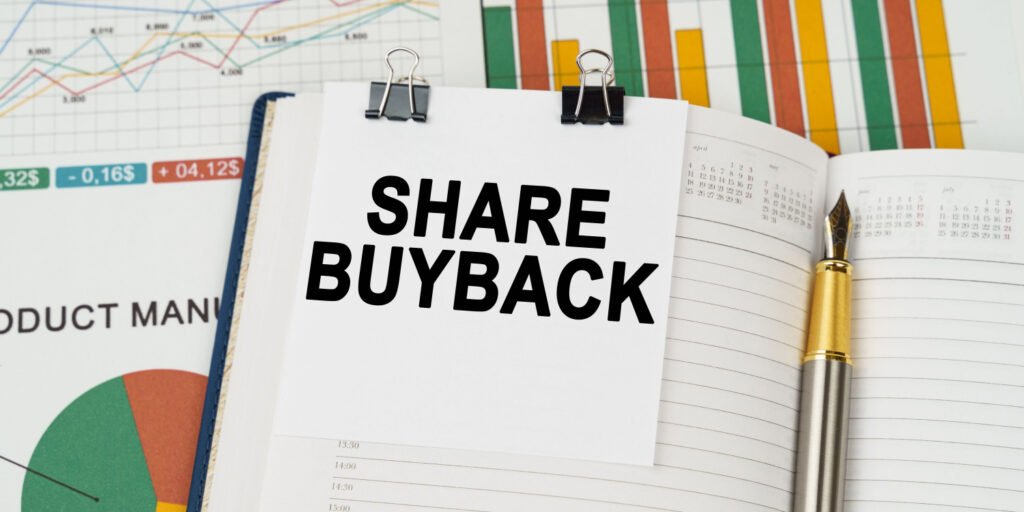Share buybacks occur in all types of private and public companies limited by shares. Also known as a ‘purchase of own shares’, a buyback is a popular and legitimate way for a company to return surplus cash to members, increase the value of shares, and provide an exit route for shareholders.
The concept of share buybacks is relatively simple, but the rules and procedures involved in such transactions are incredibly complex. We recommend seeking specialist advice if you are thinking about carrying out a buyback, or if you are a shareholder in a company that has proposed doing so.
This post provides an overview of the essential information you need to know about the topic, including the reasons why a company would purchase its own shares, the tax implications of doing so, and the steps involved in the procedure.
What is a share buyback?
A share buyback is a transaction between a limited by shares company and one or more of its existing members (shareholders), whereby the company purchases some of its own shares back from the member(s).
Essentially, the company exchanges some of its surplus cash in return for some of its issued shares. The company then cancels those shares and they cease to exist. As a result, the remaining shares are more valuable, because each one represents a larger percentage of the business.
The Companies Act 2006 allows a limited company to buy back its own shares, subject to any restrictions in its articles of association or shareholders’ agreement. Therefore, these documents should be checked in the first instance.
A limited company can finance share buybacks in one of three ways:
- from distributable reserves (i.e. profits) of the company
- using the proceeds of a fresh issue of shares carried out for the purpose of financing the purchase
- out of capital (in limited circumstances)
Companies can buy back any of their shares, including redeemable shares, provided that they are fully paid up at the time. However, a company cannot purchase its own shares if doing so would result in there being no remaining issued shares other than redeemable or those held as treasury shares.
Why would a company buy back its own shares?
The purpose of a company limited by shares is to limit shareholder liability whilst generating income and distributing some or all of the profits to its members in the most tax-efficient way.
When a company has surplus cash (retained profit) that isn’t required to maintain or grow the business, it may wish to reward shareholders with a return on their investments. Companies usually do this in the form of dividends.
However, in some situations, it is possible for a company to pay out a portion of its profits by buying back some of its shares, rather than issuing dividends payments. This can provide the following benefits:
- The members who choose to sell their shares during the buyback make a cash return on their investment
- The value of the company remains the same, but there are fewer shares in circulation. This means that the value of each remaining share increases as soon as the company cancels the repurchased shares – essentially, each one represents a bigger piece of the pie
- Each remaining shareholder enjoys an increase in their earnings per share (i.e. they receive a bigger portion of the company profits)
- The voting rights attached to the remaining shares carry more weight. This means that each shareholder with voting rights enjoys greater control over the business
- The remaining shares are more appealing to investors, because they represent a larger stake in the company
It may seem counter-intuitive for a company to reduce the number of issued shares in circulation and give money back to shareholders. However, it is generally not efficient for a company to retain a significant amount of surplus cash.
Common reasons for share buybacks
There are several reasons why a company may want to carry out a share buyback:
- To provide an exit route for a shareholder who wishes to leave the company (e.g. to retire, reinvest their money elsewhere, to get a return on their investment, or if they have passed away)
- An existing member wants to sell some or all of their shares, but they are not permitted to sell them to an external investor, and none of the other members want to buy them
- An existing member wishes to sell their shares, but they are unable to find a buyer within or outside the company
- To reduce the number of shares in issue for the purpose of raising their individual value, which increases dividend payments and/or voting power per share
- To purchase shares that were issued as part of an employee share scheme, when an individual leaves the employment of the company
However, it is important to consider the tax position of the selling shareholder(s) carefully before undertaking a purchase of own shares. Companies must also adhere to the formal procedure set out in the Companies Act, otherwise the transaction will be void.
Tax implications of share buybacks
The way in which a shareholder is taxed on the money they receive from a share buyback depends on whether the payment is treated as a distribution or capital.
If the cash received is treated as a distribution, it will be taxed similarly to a dividend payment and be liable to Income Tax. If it is treated as capital, the cash received from the disposal of the shares will be subject to Capital Gains Tax instead. Stamp Duty may also be payable if the transaction is over £1,000.
The distribution treatment applies to most buybacks, whilst the capital treatment generally only applies if:
- the company is an unquoted trading company (i.e. it is not listed in the official list of a stock exchange, and it is not a 51% subsidiary of a quoted company)
- the shareholder owns 5% or more of the company’s issued shares
- they have held the shares for at least five years
- they substantially reduce or eliminate their shareholdings
- the buyback does not form part of a tax avoidance scheme, or an arrangement to participate in the company’s profits without receiving a dividend
This is only a rudimentary overview of the tax treatment of share buybacks. More information is available in HMRC’s guidance on exempt distributions and Company Taxation Manual, but we strongly advise seeking expert tax and legal advice before carrying out a buyback of shares.
Share buyback procedure
The share buyback procedure is set out in the Companies Act 2006. The basic steps required to carry out a purchase of own shares are as follows:
- Refer to the company’s articles of association and shareholders’ agreement (if one is in place) to determine whether share buybacks are permitted or prohibited
- Hold a board meeting of the company directors to propose the purchase
- Consider the terms of the purchase agreement (including the purchase price) – these will usually be set out in a buyback agreement
- Determine how the company will finance the buyback – is there enough cash to purchase the shares?
- Ask the company’s shareholders to pass an ordinary resolution to approve the transaction (more than 50% of the votes must be in favour)
- Pay the shareholder(s) and then cancel the shares or hold them in treasury
- File the relevant paperwork with Companies House (and HMRC, if required)
The directors will have to complete Companies House Form SH03. If the company is required to pay Stamp Duty on the purchase, the directors must send the form to HMRC to be stamped before it is filed at Companies House. The Stamp Duty payment should be sent to HMRC at the same time as the form.
Afterward, HMRC will provide the company with a letter to confirm that the appropriate payment has been made. The directors should include this letter when they send form SH03 to Companies House. They should also file form SH06 within 28 days of the buyback to notify Companies House of the cancellation of the repurchased shares.
- How to look after your statutory registers
- A guide to the Register of People with Significant Control (PSC)
- Do I need a shareholders’ agreement when I set up a company?
The company will have to update its statutory register of members to reflect the changes to its shareholdings. It may also be necessary to update the register of people with significant control (PSC register).
The share certificates for the repurchased shares should be cancelled, and new certificates should be issued to any shareholders who only sold some of their shares.
A copy of the share buyback agreement must be retained for 10 years from the date of the buyback. This must be made available for inspection by the shareholders at the company’s registered office address.
Thanks for reading
A share buyback is an effective way for private and public limited companies to return surplus cash to their investors, increase the value of shares, and provide an exit route for shareholders other than transferring shares to third parties.
It can be beneficial to both a company and its members, but it’s a complex procedure that requires careful consideration and expert advice from an accountant and a corporate solicitor.
If you have any questions about this post or wish to speak to us about any of our company services, please comment below or get in touch with our team of company formation experts.
Please note that the information provided in this article is for general informational purposes only and does not constitute legal, tax, or professional advice. While our aim is that the content is accurate and up to date, it should not be relied upon as a substitute for tailored advice from qualified professionals. We strongly recommend that you seek independent legal and tax advice specific to your circumstances before acting on any information contained in this article. We accept no responsibility or liability for any loss or damage that may result from your reliance on the information provided in this article. Use of the information contained in this article is entirely at your own risk.














Join The Discussion